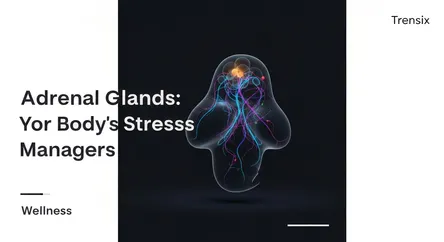Wellness
Adrenal Glands: Your Body's Stress Managers

Discover how your adrenal glands manage stress by producing key hormones and why their function is crucial for your mood and energy levels.
What is it?
The adrenal glands are small, triangular-shaped glands located on top of both kidneys. They are a core part of the endocrine system and produce essential hormones that regulate metabolism, blood pressure, the immune system, and the body's response to stress. The inner part (medulla) produces adrenaline (epinephrine), which triggers the "fight or flight" response in stressful situations by increasing heart rate and blood flow to muscles. The outer part (cortex) produces cortisol, a hormone that helps control the body's use of fats, proteins, and carbohydrates, and helps it stay on high alert during times of stress.
Why is it trending?
The function of the adrenal glands is a major topic in wellness and mindfulness due to the pressures of modern life. Chronic stress can lead to the prolonged activation of the body's stress response system. This has popularized discussions around "adrenal fatigue" as a way to describe burnout and exhaustion. While not a formal medical diagnosis, the concept highlights a growing public interest in understanding how constant stress impacts hormonal balance and contributes to feelings of being overwhelmed, anxious, or perpetually tired.
How does it affect people?
Adrenal hormones directly impact daily well-being. In a stressful event, adrenaline and cortisol provide a vital burst of energy and heightened awareness. However, when the stress response is constantly triggered, elevated cortisol levels can disrupt nearly all your body's processes. This can increase the risk of anxiety and depression, interfere with sleep cycles, and lead to feelings of irritability and mental fog. Managing stress is therefore crucial for maintaining healthy adrenal function and a balanced mood.